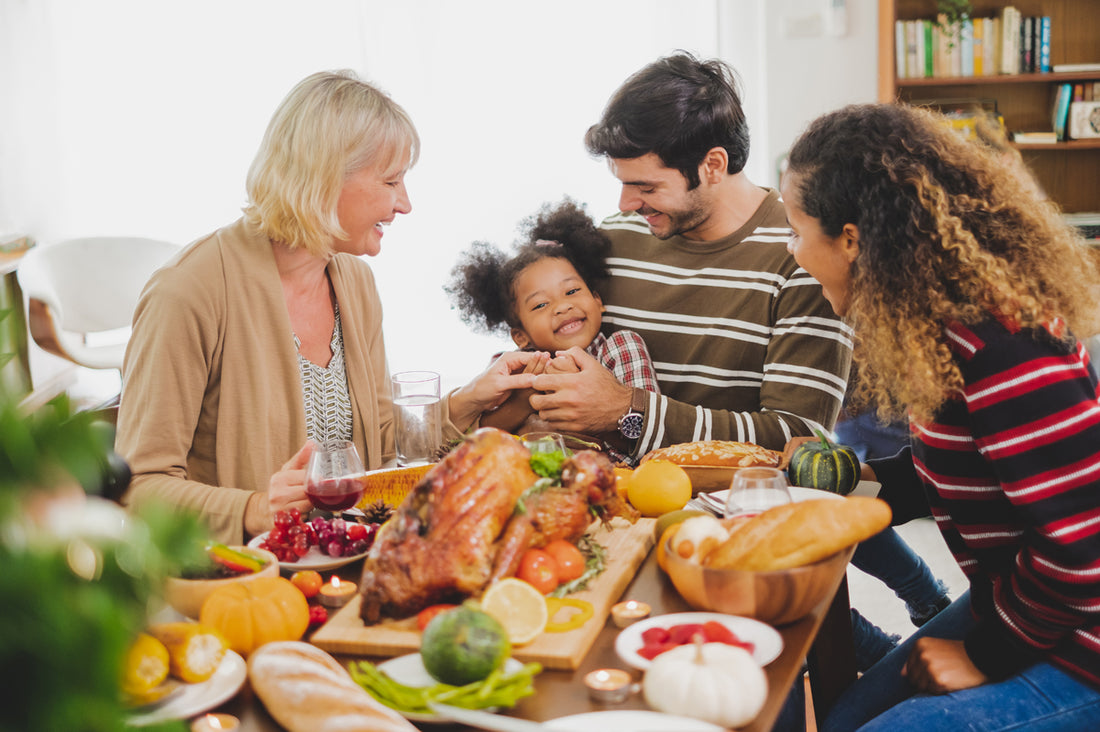
How to Avoid an Eczema Breakout at Thanksgiving Dinner This Year
Share
Thanksgiving is fast approaching, this Thursday, November 25, 2021!
Looking forward to getting together with loved ones over the holiday, you need to pay attention to any foods that might be served at the feast, that could be triggers for your eczema.
And if you are hosting Thanksgiving in your home and will be inviting someone who suffers from eczema, hold these tips in mind to help keep everyone comfortable.
Thanksgiving in Context
Did you know that the Thanksgiving celebrations we hold today date back to November 25, 1621? That was the year when the Plymouth colonists got together with Wampanoag Native Americans, to share a feast of the autumnal harvest. By 1863, president Abraham Lincoln declared a Thanksgiving Day to be held across the nation, according to History.
The Nature of Food Allergies
People who suffer from eczema can have reactions to certain foods. The problem is the body thinks various proteins in foods are on the attack. To cope with the perceived invaders, it produces chemicals that cause a reaction to eliminate the allergens. Painful skin rashes and profound flare-ups can result.

But eczema patients who keep track of the foods that tend to trigger them can breathe a sigh of relief, knowing they can avoid consuming them and keep their skin free of painful, itching sensations.
Tips for a Thanksgiving That’s Free of Eczema Flare-ups
- Know what foods can trigger a painful eczema reaction. If you are hosting, leave these ingredients/dishes off of the menu, of course. But if you are visiting someone who is hosting the holiday meal, consider offering to bring some food items that you know would be safe for you and perhaps for other guests with eczema too.
If you have young kids, it’s a good idea to remind them that even though they are excited about the big feast day, it’s not the only thing to focus on at Thanksgiving. Yes, steer them to eat only foods that they know are safe to consume. But focus on the elements of gratitude, getting together with loved ones, and taking time out of our busy schedules to commune once a year to give thanks.
- Consider visiting a doctor who specializes in allergies and immunotherapy. As noted by AllergyEasy, there are food allergy treatments that you’ll want to investigate. One example is sublingual immunotherapy, which involves a patient being prescribed special drops that you dissolve under your tongue (“sublingual”). This process makes the medication absorb into the bloodstream quite effectively.
The idea behind immunotherapy for foods that could trigger eczema reactions is that your body will start to become accustomed to the proteins in foods that can trigger a flare-up. Your immune system gradually gets desensitized. So instead of leading a life where you constantly avoid foods that you are aware can lead to painful reactions, you can feel more free in your meal selections.
-
Traveling for Thanksgiving?
If you are planning to go out of town to celebrate Thanksgiving this year, there are some things you can do to protect yourself against potential eczema flare-ups. The National Eczema Association recommends that you take care to apply moisturizer during the days before you go on your trip.

This will protect your skin against the dry air that typically is experienced by people flying on airplanes. And businesses and homes are often drier at Thanksgiving because of central heating running and removing humidity from the air.
Remember to pack all of your medications, along with copies of your prescriptions in case you run out and need a refill. Bring your favorite skin care products, including lotions and creams so you can get relief whenever needed while far from home.
After all, the last thing you’d want is to have to go online or find a local store in the middle of the holiday weekend, with shops closed to spend time with their families.
Ideally, you will bring your own sheets, blanket and towels that are hypoallergenic, whether staying with family or friends or renting a hotel room for Thanksgiving.
Have a Happy, Eczema-free Thanksgiving!
When you have a better understanding of what kinds of food choices can lead to someone experiencing an eczema reaction, you can anticipate that your Thanksgiving celebration will go smoothly. And remembering to pack your favorite creams and lotions along with your own bedding and towels will make for a more comfortable experience as a guest.
For a holiday designed to promote people feeling gratitude for what they have, we can all give thanks that there are so many options to help avoid eczema flare-ups. Plenty of traditional, tasty food choices are available so that no one will fear a bad reaction at the Thanksgiving table this year.

There’s also something to be said for relying on hygiene products that won’t trigger allergies, for family, friends and other guests this Thanksgiving. This is why so many people prefer to keep in their bathrooms some eczema-friendly, gentle foaming hand soap from Eczema Honey.
Sources
- History: Thanksgiving
- https://www.history.com/topics/thanksgiving/history-of-thanksgiving
- AllergyEasy: Top Food Allergies (and How to Work Around Them at Thanksgiving)
- https://www.allergyeasy.com/allergy/top-food-allergies-and-how-to-work-around-them-at-thanksgiving/
- National Eczema Association: Watch out for these holiday hazards
- https://nationaleczema.org/holiday-hazards/





